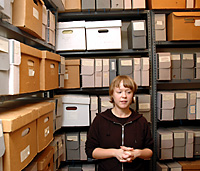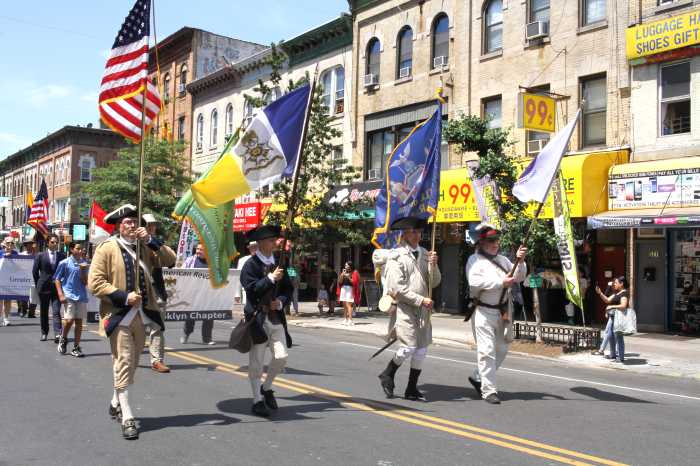As the Park Slope mommies, daddies and Bugaboos multiply, a fringe group that once dominated a piece of the neighborhood has taken itself back to the fringe.
The fringe of the Slope, that is.
No one knows it better than Cynthia Kern. When Kern, the producer of DYKE TV, moved to Brooklyn in the late 1990s, her home base was Seventh Avenue. She could walk to the Rising Cafe, a lesbian hangout, and enjoy Sunday morning at the lesbian bookshop next door.
But by 2001, Kern was based on Fifth Avenue, and both the lesbian cafe and the bookshop had closed.
Now Kern and her girlfriend live in Windsor Terrace at the edge of Kensington, one of the F-line neighborhoods attracting a share of gay families.
“I moved to Dyke Slope when it was strong,” Kern said. “Then it became Puppy Slope. Now it’s Baby Slope. We can’t fit between all the strollers there.”
The Slope has always been a place that attracted groups in droves — police officers, Irish immigrants, Hispanics and then, brownstone-craving Yuppies. Lesbians hit critical mass in the neighborhood in the 1980s and propelled Brooklyn’s “gayborhood” into the alterna-tourist guidebooks by the ’90s.
But Kern felt that “Dyke Slope” was truly dead several months ago when she caught sight of a straight couple posing for a giggly photo under the “DYKE TV” sign on her office, the boyfriend pointing exaggeratedly at the reclaimed epithet.
“The word ‘dyke’ is a novelty now,” she said. “The small-town feeling of safety is gone now and has been replaced by cute stores selling cute outfits.”
By the end of the this year, Kern expects to take down the last DYKE TV poster and move the last specifically (and politically) lesbian business off of Fifth Avenue.
Doreen DeJesus is one Sloper who will miss the DYKE TV’s ever-present rainbow flag. DeJesus spent summers as a kid at her grandmother’s house in Carroll Gardens. When the heat of the apartment got too much, she would stray to the Slope and watch what felt like a parade of women in love.
Six years ago, DeJesus came out, and moved with her partner to a sunny apartment a stone’s throw from Prospect Park.
“It’s a bit disappointing for us,” the Brooklyn Pride board member said. “I’ve finally publicly embraced my lesbianism and I wanted to be in a place that did also.
“When people hear I live in the Slope, they say ‘You must be in heaven,’” she added. “I say I got here a little too late.”
The southward shift of the lesbian community is far from surprising.
One obvious reason is the skyrocketing cost of living in Park Slope. On average, men earn 21 percent more than women, an income discrepancy that becomes wider for women-only households. But finances are only part of the neighborhood’s waning desirability among lesbians.
In the end, the real turnoff may be simply too many people who look like one another.
“I went to the Tea Lounge the other day and it totally freaked me out,” said Gabrielle Belfiglio, a lesbian who once lived in Park Slope, but has since moved to Windsor Terrace. “Everyone looked like they were part of the same photo shoot, posing with a laptop or a baby.
“There used to be a sense of diversity that isn’t there anymore,” she added. “You can walk around Windsor Terrace and Kensington and see a Hassid next to a woman in hijab next to a Jamaican kid. You can be who you are in that mix of people.”
Realtors who specialize in serving the lesbian community agree that the shift out of Park Slope speaks to an increased preference for diverse, multicultural communities.
“People aren’t looking for ghettos, whether it be gay, black or white anymore,” said David Rittenberg, a broker with Prudential Douglas Elliman. “They want a bigger mix of people.”
Rittenberg said that many of his clients no longer even ask to see apartments in Park Slope, instead focusing the search in Kensington and Windsor Terrace.
The fall of “Dyke Slope” is particularly evident at Ginger’s, Brooklyn’s oldest existing gay bar. Decorated with an Irish flag, a rainbow flag, a scratched pool table and a TV that buzzes ESPN, Ginger’s reeks of Bud Light and an unhipness foreign among the trendy bars and lounges nearby.
It has become a neighborhood bar for a neighborhood that no longer really exists.
“It’s a classic lesbian dive, but I don’t really go there,” said Erin Keeble, a young lesbian who, like many of her friends, chose to settle south of the Slope, in Sunset Park.
But Keeble, a recent college grad, still has a connection to “Dyke Slope,” albeit as its volunteer archivist.
In a brownstone not far from Prospect Park, she attends to Herstory Archives, the world’s largest repository of lesbian cultural artifacts. Three meticulous floors of shelved personal book and video collections, rare journals and stashes of kitschy pink and purple memorabilia. The library is a testament to the community that once was.
“Now our job is to make sure that history isn’t erased,” she said.























